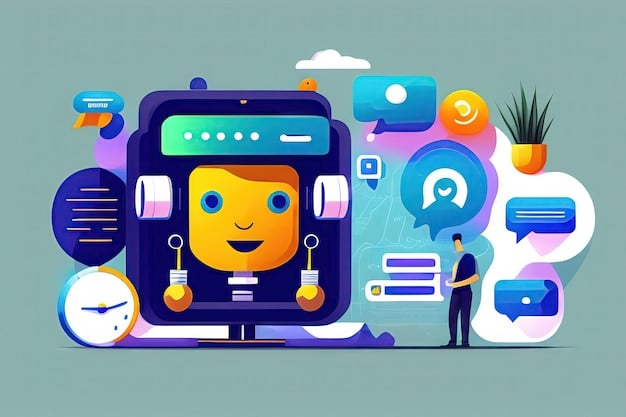Reduce Customer Service Costs: AI-Powered CX Solutions for 20% Savings

Reduce Customer Service Costs by 20% with These AI-Powered CX Solutions by automating tasks, personalizing interactions, and improving agent efficiency. Implementing AI in customer experience (CX) can lead to significant cost savings and enhanced customer satisfaction.
In today’s competitive landscape, businesses are constantly seeking innovative ways to enhance customer experience (CX) while optimizing operational efficiency. One of the most promising avenues for achieving this is through the implementation of AI-powered CX solutions. The potential to reduce customer service costs by 20% with these AI-Powered CX Solutions is becoming a tangible reality for many organizations.
This article delves into the transformative impact of AI on CX, exploring how businesses can leverage these technologies to streamline operations, improve customer satisfaction, and ultimately, achieve significant cost savings. We’ll examine specific AI applications and strategies, providing a roadmap for businesses looking to enhance their CX and bottom line.
Leveraging AI to Transform Customer Experience
Artificial intelligence is no longer a futuristic concept but a practical tool reshaping how businesses interact with their customers. The integration of AI into customer experience (CX) offers unparalleled opportunities to personalize interactions, automate routine tasks, and provide instant support. This transformation not only enhances customer satisfaction but also unlocks considerable cost efficiencies.
AI-Powered Chatbots for Instant Support
AI-powered chatbots are revolutionizing customer service by providing instant and personalized support around the clock. These virtual assistants can handle a wide range of inquiries, from answering frequently asked questions to guiding customers through complex processes. By automating these interactions, businesses can significantly reduce the workload on human agents, freeing them up to focus on more complex and critical issues.
Personalized Customer Journeys with AI
AI enables businesses to create personalized customer journeys by analyzing vast amounts of data to understand individual customer preferences and behaviors. This allows for the delivery of tailored content, recommendations, and support, enhancing customer engagement and loyalty. By anticipating customer needs and providing proactive assistance, businesses can foster stronger relationships and improve overall satisfaction.
- Improved Efficiency: AI automates routine tasks, freeing up human agents to focus on complex issues.
- 24/7 Availability: AI-powered solutions provide round-the-clock support, enhancing customer satisfaction.
- Data-Driven Insights: AI analyzes customer data to personalize interactions and improve overall CX.
- Cost Savings: Automating customer service reduces the need for large human agent teams.

In conclusion, leveraging AI can significantly transform customer experience by automating routine tasks, personalizing interactions, and providing data-driven insights. This transformation not only enhances customer satisfaction but also unlocks considerable cost efficiencies, making AI an indispensable tool for modern businesses.
Automating Customer Service with AI
Automation is a key driver of cost reduction, and AI plays a crucial role in automating various aspects of customer service. From handling simple inquiries to resolving complex issues, AI-powered solutions can streamline processes and improve efficiency. By automating repetitive tasks, businesses can reduce customer service costs by 20% with these AI-Powered CX Solutions.
AI-Driven Call Routing
AI-driven call routing systems can analyze customer inquiries and direct them to the most appropriate agent or department. This ensures that customers receive prompt and accurate assistance, reducing wait times and improving resolution rates. By optimizing call routing, businesses can enhance customer satisfaction and reduce the need for human intervention.
Automated Email Responses
AI can automate email responses by analyzing incoming messages and generating appropriate replies. This allows businesses to respond to customer inquiries quickly and efficiently, improving customer satisfaction and reducing the workload on human agents. Automated email responses can handle a wide range of inquiries, from order status updates to product information requests.
- AI-driven call routing improves efficiency and reduces wait times.
- Automated email responses provide quick and accurate assistance.
- AI-powered self-service portals empower customers to find solutions independently.
- Predictive analytics anticipate customer needs and proactively address potential issues.
The automation of customer service using AI offers a pathway to significant cost savings and improved efficiency. AI-driven call routing, automated email responses, and AI-powered self-service portals all contribute to reducing the workload on human agents and enhancing customer satisfaction. Predictive analytics further empower businesses to anticipate customer needs and proactively address potential issues.
Enhancing Agent Productivity with AI
AI can significantly improve agent productivity by providing them with real-time assistance, data-driven insights, and automated tools. By empowering agents to work more efficiently and effectively, businesses can enhance customer satisfaction and reduce operational costs. Harnessing the power of AI to reduce customer service costs by 20% with these AI-Powered CX Solutions is a win-win for both businesses and their customers.
Real-Time Agent Assistance
AI-powered agent assistance tools provide real-time guidance and support to customer service representatives during interactions. These tools can analyze customer inquiries, suggest relevant solutions, and automate administrative tasks, allowing agents to focus on providing personalized and effective service.
Data-Driven Insights for Personalized Interactions
AI can analyze vast amounts of customer data to provide agents with valuable insights into individual customer preferences, behaviors, and needs. This allows agents to personalize interactions, anticipate customer needs, and provide tailored solutions, enhancing customer satisfaction and loyalty.

- Real-time agent assistance provides guidance and support during interactions.
- Data-driven insights empower agents to personalize interactions.
- Automated tools streamline administrative tasks, reducing workload.
- AI-powered training and development programs enhance agent skills.
Enhancing agent productivity with AI leads to improved customer satisfaction and reduced operational costs. Real-time agent assistance, data-driven insights, and automated tools empower agents to work more efficiently and effectively, while AI-powered training and development programs enhance their skills and knowledge. By investing in these AI-driven solutions, businesses can unlock the full potential of their customer service teams and achieve significant cost savings.
The Role of Sentiment Analysis in CX
Sentiment analysis is a powerful AI tool that can analyze customer feedback to understand their emotions and attitudes. By identifying trends and patterns in customer sentiment, businesses can gain valuable insights into their CX and identify areas for improvement. Leveraging sentiment analysis is a critical way to reduce customer service costs by 20% with these AI-Powered CX Solutions.
Identifying Customer Pain Points
Sentiment analysis can help businesses identify customer pain points by analyzing feedback from various channels, such as surveys, reviews, and social media. By understanding the root causes of customer dissatisfaction, businesses can take proactive steps to address these issues and improve overall CX.
Measuring the Impact of CX Initiatives
Sentiment analysis can be used to measure the impact of CX initiatives by tracking changes in customer sentiment over time. This allows businesses to assess the effectiveness of their efforts and make data-driven decisions to optimize their CX strategies.
- Identify customer pain points by analyzing feedback from various channels.
- Measure the impact of CX initiatives by tracking changes in sentiment over time.
- Proactively address potential issues by monitoring real-time sentiment trends.
- Personalize interactions based on individual customer sentiment.
Sentiment analysis plays a crucial role in enhancing CX by providing valuable insights into customer emotions and attitudes. This allows businesses to identify and address pain points, measure the impact of CX initiatives, proactively address potential issues, and personalize interactions based on individual customer sentiment. Incorporating sentiment analysis into CX strategies can lead to significant improvements in customer satisfaction and loyalty.
Implementing AI: Best Practices
Implementing AI in customer experience requires careful planning and execution. Businesses should follow best practices to ensure a successful implementation and maximize the benefits of AI. To effectively reduce customer service costs by 20% with these AI-Powered CX Solutions, a strategic approach is essential.
Start with a Clear Strategy
Before implementing AI, businesses should develop a clear strategy that outlines their goals, objectives, and priorities. This strategy should identify specific areas where AI can have the greatest impact and define measurable metrics for success.
Choose the Right Technology Partners
Partnering with the right technology vendors is crucial for a successful AI implementation. Businesses should carefully evaluate potential partners based on their experience, expertise, and track record of success. Choosing a vendor with a deep understanding of CX and AI can help businesses navigate the complexities of implementation and achieve their desired outcomes.
- Develop a clear strategy outlining goals, objectives, and priorities.
- Choose the right technology partners with experience and expertise.
- Start small and scale gradually, focusing on specific use cases.
- Monitor and evaluate performance using measurable metrics.
Implementing AI requires businesses to develop a clear strategy, choose the right technology partners, start small and scale gradually, and monitor and evaluate performance using measurable metrics. By following these best practices, businesses can ensure a successful AI implementation and unlock the full potential of AI to transform their CX and achieve significant cost savings.
Measuring the ROI of AI-Powered CX
Measuring the return on investment (ROI) of AI-powered CX is essential to justify the investment and demonstrate the value of AI. Businesses should track key metrics to assess the impact of AI on customer satisfaction, operational efficiency, and cost savings. Quantifying the benefits of AI is essential to reduce customer service costs by 20% with these AI-Powered CX Solutions in a verifiable way.
Customer Satisfaction Metrics
Customer satisfaction metrics, such as Net Promoter Score (NPS), Customer Satisfaction (CSAT), and Customer Effort Score (CES), can be used to measure the impact of AI on customer satisfaction. Improvements in these metrics indicate that AI is enhancing the customer experience and driving loyalty.
Operational Efficiency Metrics
Operational efficiency metrics, such as average handle time (AHT), first call resolution (FCR), and agent utilization, can be used to measure the impact of AI on productivity. Reductions in AHT and improvements in FCR and agent utilization indicate that AI is streamlining processes and improving efficiency.
- Track customer satisfaction metrics, such as NPS, CSAT, and CES.
- Measure operational efficiency metrics, such as AHT, FCR, and agent utilization.
- Calculate cost savings resulting from AI implementation.
- Compare the ROI of AI-powered CX to traditional approaches.
| Key Point | Brief Description |
|---|---|
| 🤖 AI Chatbots | Provide instant support and handle FAQs efficiently. |
| ⚙️ Automation | Streamlines tasks, reducing workload on human agents. |
| 📈 Sentiment Analysis | Identifies customer pain points and improves CX. |
| 🎯 Personalized CX | AI tailors content improving customer engagement. |
Frequently Asked Questions
AI automates routine tasks, enhances agent productivity, and provides data-driven insights, reducing workload and improving efficiency. These factors enable companies to reduce customer service costs by 20% with these AI-Powered CX Solutions.
AI-powered chatbots provide instant support, handle FAQs, and free up human agents for complex issues. They also operate 24/7, improving customer satisfaction.
Sentiment analysis identifies customer pain points, measures the impact of CX initiatives, and proactively addresses potential issues, leading to enhanced customer satisfaction and better service. By leveraging this information, companies using the AI-Powered CX Solutions can reduce customer service costs by 20% with these AI-Powered CX Solutions.
Key metrics include Customer Satisfaction (CSAT), Net Promoter Score (NPS), Customer Effort Score (CES), Average Handle Time (AHT), and First Call Resolution (FCR).
The first step is developing a clear strategy that outlines goals, objectives, and priorities. This ensures that AI implementation aligns with business needs and that you can effectively reduce customer service costs by 20% with these AI-Powered CX Solutions.
Conclusion
Implementing AI-powered CX solutions offers a transformative opportunity to streamline operations, enhance customer satisfaction, and achieve significant cost savings. By automating routine tasks, personalizing interactions, and improving agent efficiency, businesses can realistically reduce customer service costs by 20% with these AI-Powered CX Solutions.
Embracing these innovative technologies is crucial for staying competitive and delivering exceptional experiences in today’s dynamic marketplace. The future of CX is undoubtedly intertwined with AI, and businesses that leverage its capabilities will be best positioned for long-term success.





